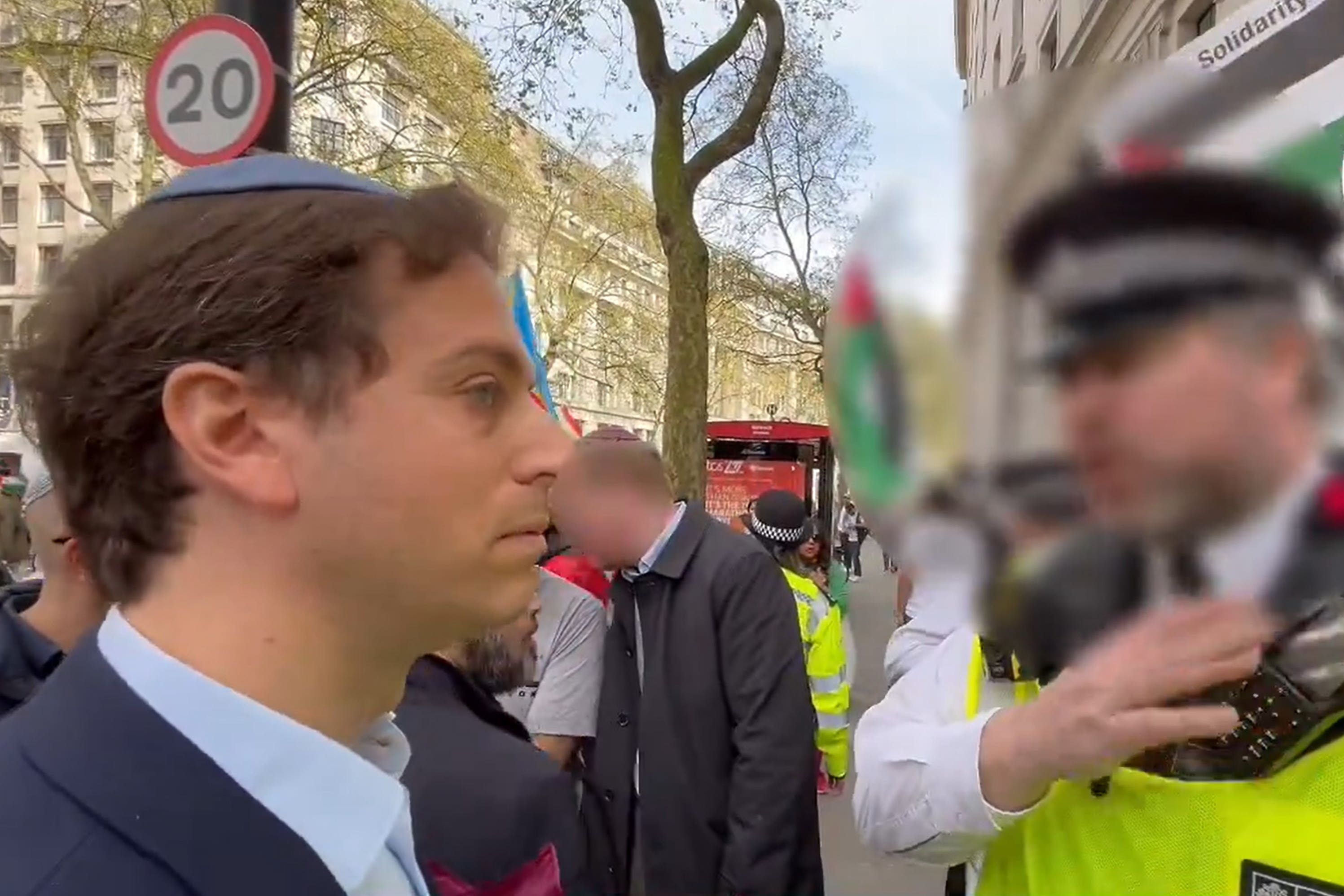How Jewish-looking do you have to be to be considered too provocative to cross the road?
During the now-routine pro-Palestine marches through London on Saturdays, should Jewish people like me have to take detours or adjust our appearance because the Metropolitan Police is seemingly incapable of distinguishing between free speech and hate speech, asks Mark Honigsbaum

Is it only Jews who sport kippas and Magen Davids (Stars of David) who should fear for their safety as they go about their business in central London? Or – in the wake of the video of antisemitism campaigner Gideon Falter being told by a policeman that it was not safe for him to cross a pro-Palestinian rally in Aldwych because he was “openly Jewish” – should all British Jews now fear for their safety?
I am Jewish and have lived in London all my life. During that time, I have participated in, or in my capacity as a journalist, observed countless demonstrations, including marches by pro-Palestinian demonstrators who share my dismay at the appalling carnage being wrought in Gaza by Israel.
The difference between me and Falter is that I do not appear openly Jewish, and have never been told by a policeman that they are concerned by “the reaction to my presence”, as Falter was nine days ago.
But what if I, at one of the pro-Palestinian demonstrations, were to openly challenge the offensive comparisons between Jews and Nazis that have become routine at such rallies? Or the patently absurd claim, made by one demonstrator filmed by the Campaign Against Antisemitism a few weeks ago, that “the Jewish people control Britain”?
Britain has a long tradition of free speech and tolerance of dissent. But if the Met’s tolerance of the almost weekly pro-Palestinian demonstrations is a guide, Jews are a long way from controlling London, much less Britain.
Nor should I have to shut my mouth or take a detour because the Met is seemingly incapable of distinguishing between free speech and hate speech, and acting decisively to arrest those intent on causing offence – and, in some cases, inciting violence – against British Jews.
But that is the sad state that the Metropolitan Police Commissioner Sir Mark Rowley has brought us to by making Jews scapegoats for his softly-softly approach to antisemites and conspiracy theorists.
Whether or not Falter was merely trying to get from one side of Aldwych to the other – or, as a longer exchange with the policeman released by Sky News suggests – deliberately moved towards the marchers in the hope of provoking a reaction, is immaterial, as Falter was not carrying a pro-Israeli banner or signage.
Nor should police officers be placed in the invidious position of deciding what may – or may not – be in another person’s mind, as the officer who confronted Falter did when he accused him of being “disingenuous” and seeking to provoke a confrontation, and said he had “no confidence” that were Falter to remove his skullcap he wouldn’t put it back on.
For six long months, the Campaign Against Antisemitism, of which Falter is the chief executive, has been calling for the Met to arrest those who exploit our tradition of tolerance to send dog whistles to their supporters.
Much has been made by organisers of the pro-Palestine marches being “peaceful”, and that Jewish people critical of the actions of the Israeli government in Gaza have been taking part. But that doesn’t recognise a number of incidents that raise questions about the intentions of some participants: chants such as “There is only one solution – intifada revolution” and “From the river to the sea, Palestine will be free”, widely interpreted as calling for the destruction of Israel.
The Met has been known to turn a blind eye to banners bearing clearly antisemitic slogans, or racist tropes, such as a snake, in the colours of the Israeli flag, encircling the world.
Last month, another Met officer told a Jewish woman, who had pointed out the swastikas on banners at the pro-Palestine march, that they were “not necessarily antisemitic or a disruption of public order”, and “needed to be taken in context”.
Unfortunately, by stopping an Englishman from exercising his right to cross the road, the police only reinforce the marchers’ message that Jews are somehow not entitled to the same courtesies as everyone else.





Join our commenting forum
Join thought-provoking conversations, follow other Independent readers and see their replies
Comments